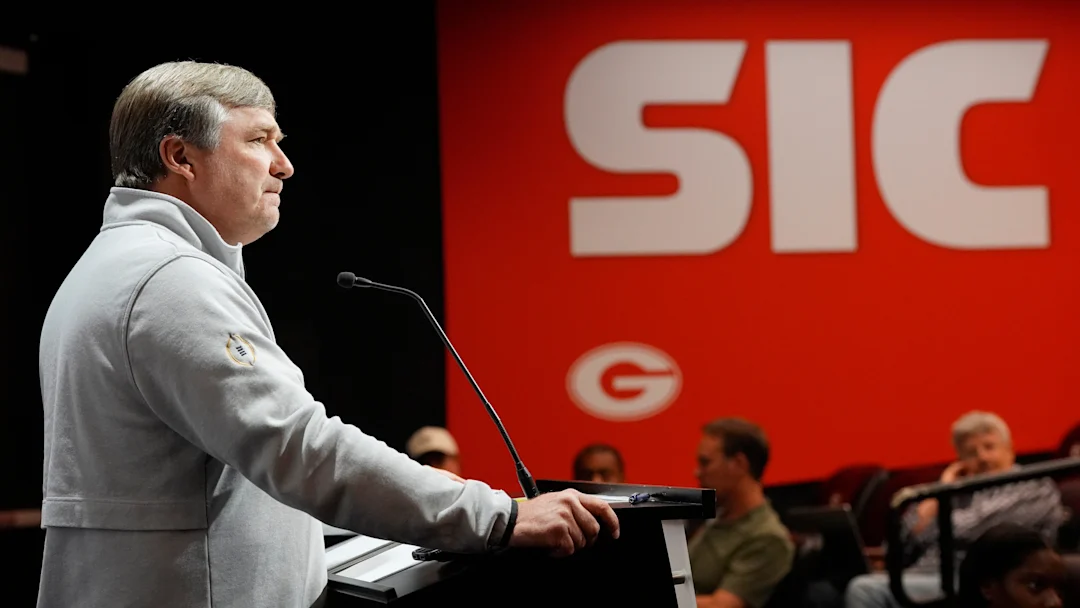College sports have undergone a seismic shift since the advent of Name, Image, and Likeness (NIL) rights, and perhaps no one is feeling the ground move more than the coaches tasked with guiding programs through this new era. Georgia head football coach Kirby Smart has become one of the latest prominent voices to weigh in on a growing issue that’s quietly reshaping the landscape of college athletics: the increasing influence of player agents in the NIL space.
Smart, who has led Georgia to national prominence and built one of the most consistent programs in the country, is known for his straight-shooting approach and thoughtful perspective on the evolving world of college football. In a recent conversation with reporters, he made it clear that while he supports players earning what they deserve through NIL opportunities, the role that agents are beginning to play in shaping those deals—and sometimes even player decisions—is becoming a serious concern.
According to Smart, the rise of agents representing college athletes is a double-edged sword. On one hand, professional representation can help young players navigate complex contracts, build their brand, and avoid being taken advantage of. On the other hand, the unchecked influence of some agents is starting to distort the collegiate experience and insert business motives into what used to be purely developmental decisions. It’s a new kind of pressure point in an already high-stakes environment.
He pointed out that what started as a system to allow players to profit from their own brand has evolved into something closer to free agency—with agents often at the center of it. These agents, many of whom also represent professional athletes, are not just helping players sign endorsement deals. They are influencing recruiting decisions, encouraging transfers, and even pressuring schools during NIL negotiations. Smart likened it to a “back channel” system where the traditional relationships between coach and player are being disrupted by intermediaries with their own agendas.
Smart’s comments reflect a broader concern shared by coaches across the country. NIL was never supposed to be a recruiting tool—or at least, not officially. But in practice, many agents have found ways to leverage NIL to steer players toward programs offering the most lucrative deals. And while coaches can’t legally promise NIL money during recruitment, agents and collectives can—and often do—act on behalf of the player in ways that clearly influence their final decision. The result is a gray area that has fundamentally changed how teams are built, retained, and managed.
The Georgia coach didn’t go so far as to suggest banning agents altogether, but he did call for clearer regulations and more transparency in the process. Without a governing body providing guardrails, he said, the sport risks becoming overly transactional, where relationships are secondary to payouts and development takes a backseat to deal-making. In his view, college football should still be about preparing young men for life—whether in the NFL or not—and helping them grow as student-athletes. When agents take the lead, the developmental model can get lost in the noise.
Smart also acknowledged that not all agents are bad actors. Many are legitimate professionals who have their clients’ best interests at heart. But the problem, he said, lies in the lack of oversight and the flood of inexperienced or unqualified individuals entering the space, drawn by the promise of fast money. He cited cases where agents have overpromised NIL earnings to players, only for those deals to fall through or create unrealistic expectations. That, in turn, can lead to disillusionment, instability, or even players entering the transfer portal in search of better financial opportunities that may not materialize.
These trends have already had a visible impact on roster management. Smart spoke candidly about how the traditional rhythms of program building—recruiting high school talent, developing players over several years, and building continuity—are being disrupted by the fluidity of NIL-driven decisions. Some players now view college as a year-to-year venture, guided more by where the biggest check comes from than by fit, coaching, or long-term development. That’s not just a challenge for coaches; it’s a cultural shift that reshapes team chemistry, loyalty, and leadership.
Georgia has managed to thrive despite the chaos, but Smart admitted it hasn’t been easy. The Bulldogs have invested heavily in NIL infrastructure, including partnerships with collectives and educational programs to help players navigate the space responsibly. But even with those resources, the pull of outside agents can complicate matters. In some cases, Smart said, conversations with recruits or current players are filtered through agents, making it harder to establish the kind of direct, personal relationships that are the foundation of successful programs.
He also pointed to the role that collectives play in this dynamic. Collectives—groups of boosters or alumni that pool money to fund NIL deals—often work closely with agents to negotiate opportunities. While many of these relationships are above-board, Smart expressed concern about the growing power of collectives that operate independently of athletic departments. Without tighter integration or regulation, he said, schools can be held hostage to the demands of agents and collectives whose goals may not always align with the program’s values or priorities.
The irony isn’t lost on Smart. Georgia, like many elite programs, benefits from NIL. The Bulldogs have attracted top talent in part because of the opportunities available in Athens. But Smart believes the system needs reform to ensure it serves the right purpose. His call is not for less NIL—it’s for smarter NIL, where players are protected, coaches are informed, and decisions are driven by more than just money. He supports players having the freedom to profit from their brand, but he wants to see a system that also protects their long-term interests and maintains the integrity of the sport.
That might mean the NCAA stepping in with more concrete rules, or it could require Congress to establish a national NIL framework—something Smart and other coaches have advocated for. Without a uniform set of standards, every state, school, and conference is playing by slightly different rules, and that inconsistency only empowers agents to manipulate the system. It creates loopholes, fosters mistrust, and undermines the competitive balance that college athletics is supposed to uphold.
Smart’s remarks arrive at a time when NIL is once again dominating headlines. Several high-profile transfers have been linked to multi-million dollar NIL deals, and whispers about agent involvement in those decisions are growing louder. Meanwhile, some players have reportedly left programs after promised deals fell through, leaving coaches scrambling and rosters in flux. For Smart, this isn’t about resisting change—it’s about managing it responsibly.
He also emphasized the need for better education—not just for players, but for their families. Many college athletes come from backgrounds where financial literacy is limited, and the allure of big numbers can cloud judgment. Smart believes schools should be doing more to equip athletes with the tools they need to make informed decisions, and to recognize when they’re being misled or manipulated. That kind of support, he said, is just as important as strength training or film study.
Despite the challenges, Smart remains optimistic. He believes college football can adapt, just as it always has. He sees NIL as a net positive when implemented correctly, and he’s proud of the way his program has embraced the new reality. But he’s also wary of the long-term implications if the current trends go unchecked. The influence of agents isn’t going away—but it must be managed, guided, and, where necessary, curtailed for the good of the players and the game.
In the end, Smart’s message is one of balance. Let the players profit, but protect them. Embrace change, but regulate it. Welcome outside support, but don’t lose the soul of college athletics in the process. For Georgia and programs across the country, the path forward is clear, even if it’s not easy. And if voices like Smart’s are heard, there’s still hope for a college football model that blends tradition with innovation—without sacrificing what made the sport great in the first place.



